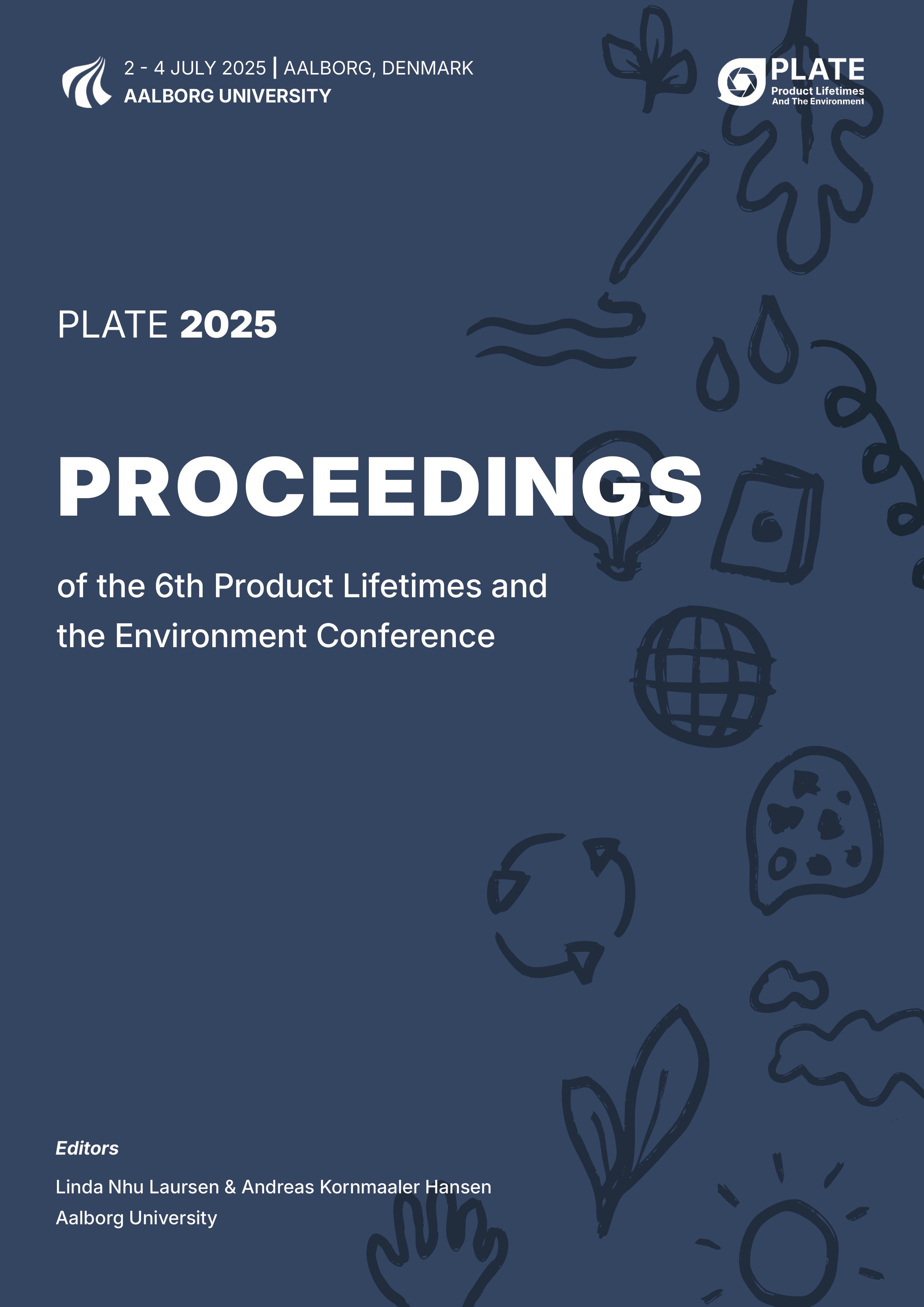Testing methods of remanufacture of pre-consumer textiles in scalable environments
DOI:
https://doi.org/10.54337/plate2025-10414Keywords:
Textiles, Remanufacture, Upscaling, Pre-consumer, Circular economyAbstract
Despite a growing response by multiple stakeholders to address waste issues in the industry, the consumer appetite for newness and the speed and agility of the mass manufacturing system encourages overconsumption Currently, less than 1% of the material used to produce clothing is recycled into new clothing.
As Walter Stahel notes, wasted material is also wasted money, meaning that increasingly industry stakeholders are looking to exploit the potential economic benefit of ‘remanufacture’ or ‘upcycling’. While many micro-businesses are utilising upcycling on a small scale, the impact on the overall resource wastage is minimal.
This paper explores how working in a factory environment can give greater insight into the challenges of working with remanufacture for scale. It will support a greater understanding of the barriers that are impeding the widespread adoption of working with Whole Product (WP) fallout on a production line, while helping to identify the frameworks needed to support methods of WP Remanufacture (WPRem) within the linear commercial environment.
References
Ahmed, F., Fattani, M. T., Ali, S. R., & Enam, R. N. (2022). Strengthening the Bridge Between Academic and the Industry Through the Academia-Industry Collaboration Plan Design Model. Frontiers in Psychology, 13. https://doi.org/10.3389/fpsyg.2022.875940
All-Party Parliamentary Sustainable Resource Group (2014) Triple win: the economic, social and environmental case for remanufacturing [online]. Available at: https://www.policyconnect.org.uk/apsrg/sites/site_apsrg/files/report/535/fieldreportdownload/triplewin-thesocialeconomicandenvironmentalcaseforremanufacturing.pdf .
Anguelov, N. (2021) The Sustainable Fashion Quest; Innovations in Business and Policy. Oxford: Routledge.
Child, (2020) What is Fallout Fashion? In: Research Circles; A collection of essays and interviews by researchers at Centre for Circular Design, Ed. Earley, R. (2020), University of Arts London.
Ellen MacArthur Foundation (2017) A new textiles economy: redesigning fashion's future. Ellen MacArthur Foundation [Online]. Available at: https://www.ellenmacarthurfoundation.org/circular-economy/overview/concept.
Ellen Macarthur Foundation. (2021) Circular Design for Fashion. Ellen Macarthur Foundation Publishing: Cowes.
Evans, S, Park, C (2017) The Trans Textile Project Report. Centre for Industrial Sustainability [online]. Available at: https://www.ifm.eng.cam.ac.uk/uploads/Resources/TransTextile_Report.pdf
Fallman, D. (2008) ‘The Interaction Design Research Triangle of Design Practice, Design Studies, and Design Exploration’, Design Issues, 24(3), pp. 4–18. doi: 10.1162/desi.2008.24.3.4.
Hall, C. (2021) Design for Recycling Knitwear: a framework for sorting, blending and cascading in the mechanical textile recycling industry. Ph.D. Thesis. University of the Arts London. Available at: https://www.cathrynannekahall.co.uk/_files/ugd/eb22a2_ee68275805c64f718fe2cde4d9526b39.pdf
Hameed, S. (2020) Interview with Emjayi Manufacturing. Interview by Emmeline Child.
Han, S., Tyler, D. and Apeagyei, P. (2015) Upcycling as a Design Strategy for Product Lifetime Optimisation and Societal Change. In: PLATE (Product Lifetimes And The Environment) Conference, 2015. Nottingham. https://www.researchgate.net/publication/293487790_Upcycling_as_a_design_strategy_for_product_lifetime_optimisation_and_societal_change
Hirscher, A-L., Niinimäki, K. and Armstrong, C. (2018) Social Manufacturing in the Fashion sector: New value creation through alternative design strategies? Journal of Cleaner Production. 172, pp.4544-4554. https://doi.org/10.1016/j.jclepro.2017.11.020
Keßler, L. Matlin, S. Kümmerer, K, (2021) The contribution of material circularity to sustainability—Recycling and reuse of textiles. In: Current Opinion in Green and Sustainable Chemistry. Volume 32. [online] Available at: https://doi.org/10.1016/j.cogsc.2021.100535.
Kerr, J. and Landry, J. (2017) Pulse of the Fashion Industry, 2017. Global Fashion Agenda: Boston [online]. Available at: https://www.globalfashionagenda.com/publications-and-policy/pulse-of-the-industry/
LIFE ECAP (2019) European Sustainable Clothing Action Plan LIFE14 ENV/UK/000257, [online] Available at: http://www.ecap.eu.com/
Mazzarella, F (2022) We must co-create to decolonise fashion. UAL [Online] Available at: https://ualresearchonline.arts.ac.uk/id/eprint/18955/1/we-must-co-create-to-decolonise-fashion.pdf
McQuillan, H. (2019) Zero Waste Design Thinking. Licentiate Thesis. University of Borås. Available at: http://hb.diva-portal.org/smash/get/diva2:1478307/FULLTEXT01.pdf
Payne, A. (2015) Open- and Closed-loop Recycling of Textile and Apparel Products. In Muthu, S. (ed.) Handbook of Life Cycle Assessment (LCA) of Textiles and Clothing. United Kingdom: Woodhead Publishing, pp.103-123. https://doi.org/10.1016/B978-0-08-100169-1.00006-X
Pedersen, E.R.G., Earley, R. and Andersen K.R. (2019) From singular to plural: exploring organisational complexities and circular business model design. Journal of Fashion Marketing and Management. 23 (3), pp.308-326. https://doi.org/10.1108/JFMM-04-2018-0062
Reed, M.S., Stringer, L.C., Fazey, L. Evely, A.C., Kruijsen, J.H.J. (2014) Five principles for the practice of knowledge exchange in environmental management, Journal of Environmental Management. Volume 146, pp.337-345, Available at: https://doi.org/10.1016/j.jenvman.2014.07.021.
Rogers, M. (2012) ‘Contextualizing Theories and Practices of Bricolage Research’, The Qualitative Report, 17(48), pp. 1–17. https://doi.org/10.46743/2160-3715/2012.1704
Sinha, P., Muthu, S. S. and Dissanayake, G. (2016) Remanufactured Fashion. Singapore: Springer. DOI:10.1007/978-981-10-0297-7
Smyth, A and Holian, R (2008) Credibility issues in research from within organisations. in. Researching Education from the Inside. Routledge. ISBN 9780203932353
Stahel, W.R. (2019) The Circular Economy: A User’s Guide. Abingdon: Routledge.
Sung, K., Cooper, T., Painter-Morland, M., Oxborrow, L., Ramanathan, U. and Singh, J. (2017) Multi-stakeholder perspectives on the challenges and success factors for scaling-up upcycling businesses in fashion industry in the UK. In: The 18th European Roundtable on Sustainable Consumption and Production Towards a Greener Challenge & Evolution in the Framework of the Circular Economy Conference, 2017. Greece. Available at: https://www.researchgate.net/publication/320702213_Multi-stakeholder_perspectives_on_the_challenges_and_success_factors_for_scaling_up_upcycling_businesses_in_fashion_industry_in_the_UK
Szaky, T. (2014) Outsmart Waste: The Modern Idea of Garbage and How to Think Our Way Out of It. San Francisco: Berrett Koehler Publishing.
Vuletich, C. (2014) ‘Sustainable Textile Design as bricolage’, in Proceedings of In a Reverse Fashion: A Critical Agenda for Sustainable Fashion, Centre for Fashion Studies, Stockholm University, Stockholm, Sweden. Available at: https://www.academia.edu/7707960/Sustainable_Textile_Design_as_bricolage
Xiong, Y., Zhou, Y., Li, G., Chan, H.K. and Xiong, Z. (2013) Don’t forget your supplier when remanufacturing. European Journal of Operational Research. 230 (1), pp.15-25. https://doi.org/10.1016/j.ejor.2013.03.034
Young, C., Jirousek, C. and Ashdown, S. (2004) Undesigned: a study in sustainable design of apparel using post-consumer recycled clothing. Clothing and Textiles Research
Journal. 22 (1-2), pp.61-68. https://www.researchgate.net/publication/247783734_Undesigned_A_Study_in_Sustainable_Design_of_Apparel_Using_Post-Consumer_Recycled_Clothing




